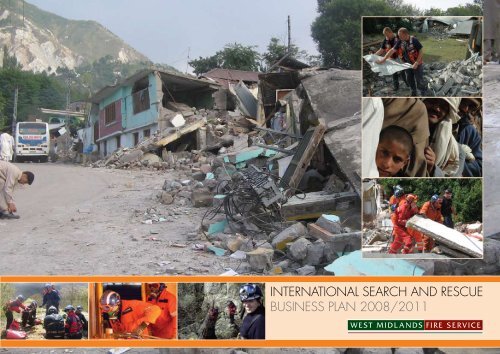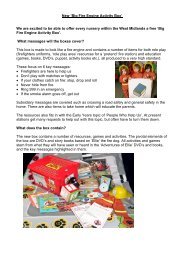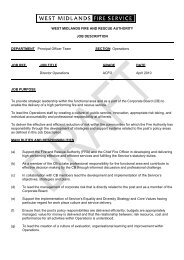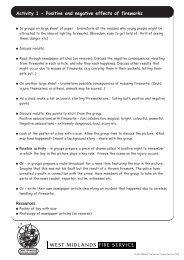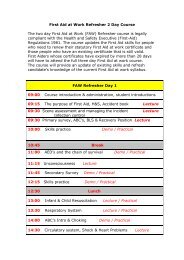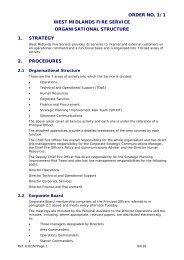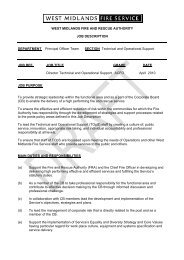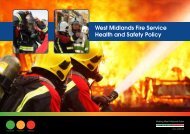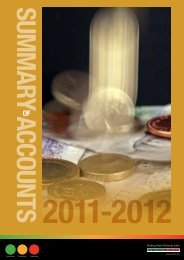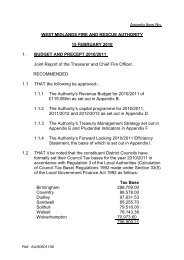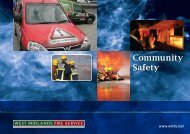ISAR Business Plan 2008/11 - West Midlands Fire Service
ISAR Business Plan 2008/11 - West Midlands Fire Service
ISAR Business Plan 2008/11 - West Midlands Fire Service
Create successful ePaper yourself
Turn your PDF publications into a flip-book with our unique Google optimized e-Paper software.
INTERNATIONAL SEARCH AND RESCUE<br />
BUSINESS PLAN <strong>2008</strong>/20<strong>11</strong>
2 <strong>ISAR</strong> BUSINESS PLAN<br />
The Mission Statement:<br />
“Our Mission is to provide a professional,<br />
effective and efficient response to<br />
International and UK Disasters on behalf of the<br />
Government of the United Kingdom”
INTERNATIONAL SEARCH AND RESCUE<br />
3 YEAR BUSINESS PLAN<br />
<strong>ISAR</strong> BUSINESS PLAN 3<br />
Contents:<br />
Foreword by Chief <strong>Fire</strong> Officer 4<br />
Introduction by WMFS <strong>ISAR</strong> Commander 5<br />
WMFS <strong>ISAR</strong> Team Structure 6<br />
National Governance Arrangements 7<br />
National Mobilising Arrangements 8<br />
UK <strong>ISAR</strong> Deployments 9<br />
Deployments 10<br />
Tanzania Capacity Building <strong>11</strong><br />
Kashmir Earthquake 12<br />
Pakistan Capacity Building 13<br />
Birmingham Tornado 14<br />
Training Standards 15<br />
Core Skills Modules 16<br />
Specialist Skills Modules 17<br />
Maintenance of Competence Training 18<br />
Organisational Benefits 19<br />
Financial Resourcing 20<br />
3 Year <strong>Plan</strong> 22<br />
5 Year Aspirations 23<br />
<strong>ISAR</strong> Adopted Charity 25<br />
Notes 25
4 <strong>ISAR</strong> BUSINESS PLAN<br />
Foreword from the Chief <strong>Fire</strong> Officer: Developing the International Search and Rescue Team’s <strong>Business</strong> <strong>Plan</strong>.<br />
Vij Randeniya<br />
OBE MA BA(Hons) MI<strong>Fire</strong>E<br />
Chief <strong>Fire</strong> Officer<br />
<strong>West</strong> <strong>Midlands</strong> <strong>Fire</strong> <strong>Service</strong><br />
The <strong>West</strong> <strong>Midlands</strong> <strong>Fire</strong> <strong>Service</strong> has been an integral part of the UK Government’s response to overseas disasters<br />
since the inception of the United Kingdom <strong>Fire</strong> <strong>Service</strong> Search and Rescue Team (UKFSSART) in 1991. During its<br />
17 year history the team has grown in experience and developed in capability to that of a highly skilled, well<br />
motivated, resourceful and dedicated group of firefighters who have repeatedly demonstrated their ability to<br />
deploy at short notice to some of the worlds worst disasters. This was most evident during their latest deployment<br />
to the earthquake in Kashmir, where their achievements were internationally acclaimed.<br />
I am immensely proud of our teams’ achievements and am similarly supportive of their aspirations for future<br />
development. I wholeheartedly support and endorse their professionalism and accomplishments and I am also<br />
grateful for their efforts in acquiring and maintaining the competencies required for inclusion and membership<br />
within the United Nation’s Heavy Rescue Response. Additionally, <strong>West</strong> <strong>Midlands</strong> <strong>Fire</strong> Control has embraced the<br />
challenge of joint responsibility with Hampshire FRS for the mobilisation of the UK International Search<br />
and Rescue.<br />
I also endorse the teams intention to build upon our partnerships across the world and continue to strengthen<br />
capacity building operations in less developed countries and with organisations such as Swedish Rescue<br />
<strong>Service</strong>s Agency (SRSA) and Department for International Development (DFID) in a bid to optimise our resources<br />
and maximise our joint capabilities. This also aligns with the DFIDs aim of “Improving the quality of European<br />
Community development and humanitarian assistance through reforms and capacity building”.<br />
It is encouraging to view the governments’ recent changes to mobilising protocols surrounding the UK response<br />
within the United Nations and the European Community Mechanism as a unified deliverance of emergency aid.<br />
I am entirely confident that you will witness the continued growth and consolidation of the teams standing within<br />
the International theatre of operations, as they continue to take leading roles within the UK International Search<br />
and Rescue structure, for which we can all be justifiably proud.
Introduction - <strong>ISAR</strong> Commander<br />
I am delighted to introduce the strategic business plan for the <strong>West</strong> <strong>Midlands</strong> International Search and<br />
Rescue (<strong>ISAR</strong>) team <strong>2008</strong> – 20<strong>11</strong>.<br />
The <strong>West</strong> <strong>Midlands</strong> team is part of the wider UK-<strong>ISAR</strong> team which is dedicated to the provision of a<br />
professional and effective response capability on behalf of the UK government to disasters all over the world.<br />
I am proud to say that our team members are exceptional in their commitment, professionalism and<br />
dedication to the team and the roles we are required to undertake. This level of excellence doesn’t just<br />
happen; the team leaders pride themselves in the extensive and painstaking selection process that we<br />
put all of our personnel through in order that we only select the best of the best.<br />
Primarily our role is that of Search and Rescue in collapsed structures; however, the <strong>West</strong> <strong>Midlands</strong> team has<br />
also invested a great deal financially and in training to develop a Command and Control capability that is<br />
second to none, which will support the full UK-<strong>ISAR</strong> team when deployed. We recognise the need to keep<br />
ahead of the changing face of disasters and for that reason we have and will develop further our skills in<br />
Rope Rescue, Water Rescue, and Wide Area Search.<br />
As a team we believe in cascading to others the skills that we have acquired and we will continue to do this,<br />
especially in those areas of the world that will benefit most. We have and will continue to achieve this by<br />
working in partnership with other influential international organisations as this is not only more efficient but<br />
also more effective in achieving the overall objective.<br />
<strong>ISAR</strong> BUSINESS PLAN 5<br />
Alan Pellowe<br />
<strong>ISAR</strong> Commander<br />
<strong>West</strong> <strong>Midlands</strong>
6 <strong>ISAR</strong> BUSINESS PLAN<br />
<strong>ISAR</strong> Commander - <strong>West</strong> <strong>Midlands</strong><br />
Alan Pellowe<br />
Birmingham
National Governance arrangements<br />
Brief History<br />
Communities and Local Government, Department for International Development and the Cabinet Office are fully committed<br />
to providing an emergency response to both man made and natural disasters that may occur within the European Union and<br />
to the rest of the world. As a consequence HM <strong>Fire</strong> <strong>Service</strong>s Inspectorate was asked to establish a team with the capability of<br />
responding to and managing all anticipated catastrophic events.<br />
A letter to the Chief Officer dated 9/1992, laid out the arrangements for the establishment of this team and as a consequence a<br />
Memorandum of Understanding (MOU) was signed by the CFO on behalf of the <strong>Fire</strong> Authority giving a commitment to becoming<br />
a member of the United Kingdoms <strong>Fire</strong> <strong>Service</strong>s Search and Rescue team (UKFSSART). Since the conception of the team in 1993<br />
there have been many changes at the strategic level to the national and international structures; however WMFS has always<br />
remained committed to providing a team capable of “providing humanitarian assistance to international communities”.<br />
Governance<br />
A recent change to the national structure now means that we have a CFOA lead responsible for UK <strong>Fire</strong> <strong>Service</strong>s overseas<br />
operations. Currently this position is held by CFO Mike Thomas from Lincolnshire FRS, who also represents <strong>ISAR</strong> on the<br />
national USAR User Group and feeds information back to individual Chief <strong>Fire</strong> Officers on:<br />
• operational standards<br />
• competency requirements<br />
• equipment compatibility<br />
• administrative arrangements<br />
• insurance provisions<br />
• health and safety management<br />
• equality protocols<br />
• records and audit systems.<br />
It is clear that these arrangements will provide a stable footing on which we can progress<br />
<strong>ISAR</strong> for the future and limit any risks or liability. The diagram on the next page explains how<br />
the full national structure is arranged:<br />
<strong>ISAR</strong> BUSINESS PLAN 7
8 <strong>ISAR</strong> BUSINESS PLAN<br />
<strong>West</strong> <strong>Midlands</strong><br />
<strong>Fire</strong> and Rescue<br />
Authority<br />
WMFS CFO<br />
WMFS <strong>ISAR</strong><br />
National<br />
USAR<br />
Working Group<br />
USAR<br />
Technical Leads<br />
Manager
National Mobilising Arrangements<br />
<strong>ISAR</strong> BUSINESS PLAN 9<br />
<strong>ISAR</strong> comprises of selected personnel from 13 FRS and responds to International Incidents under the auspices of the Department for<br />
International Development (DFID) and the European Union Civil Protection Mechanism. To ensure that we are able to meet with the<br />
mobilising requirements of both DFID and the EU, UK <strong>ISAR</strong> has put in place standards that all FRS teams will comply with:<br />
1. Maintenance of an immediate communication capability.<br />
2. All UK-<strong>ISAR</strong> teams 24 hour contact details are held by the resource and mobilising centre.<br />
3. On receipt of a mobilisation, WMFS will make available one team of 6 personnel led by a Team leader for Command<br />
Support duties and second team of 6 personnel when on call for Search & Rescue duties. The <strong>West</strong> <strong>Midlands</strong> command<br />
support team will deploy on every UK deployment.<br />
4. Deployment of sufficient equipment to be able to undertake command support duties for the UK team, and be prepared<br />
to undertake duties as per INSARAG guidelines.<br />
5. All personnel must have a passport valid for a minimum of 6 months.<br />
6. All personnel mobilised must possess the required skills and be competent to perform heavy USAR operations.<br />
7. All personnel must be inoculated the required standards and carry an up to date vaccination record.<br />
8. All personnel must have appropriate and sufficient PPE, both for USAR operations and the environment encountered<br />
during deployment.<br />
9. Ensure that the team can be transported to the point of departure within 6 hours of the mobilisation alert.<br />
10. Be self-sufficient for a minimum of 10 days (shelter, food, water and sanitation).<br />
Mobilisation of <strong>ISAR</strong> will be carried out by the national mobilising centre, which is a shared responsibility between Hampshire<br />
FRS and <strong>West</strong> <strong>Midlands</strong> FRS who will undertake all arrangements for mobilisation of the UK team and act as a communications hub<br />
for all overseas deployments. This arrangement provides a robust approach to UK mobilisation.
10 <strong>ISAR</strong> BUSINESS PLAN<br />
UK - <strong>ISAR</strong> Deployments<br />
YEAR AREA TYPE OF RESPONSE <strong>West</strong> <strong>Midlands</strong> within UK<br />
Response<br />
1995 Romania Capacity Building <strong>West</strong> <strong>Midlands</strong> only response<br />
1996 Romania Capacity Building <strong>West</strong> <strong>Midlands</strong> only response<br />
1996 Bosnia Capacity Building Yes<br />
1996 Montserrat, Caribbean Capacity Building No<br />
1997 Montserrat, Caribbean Capacity Building No<br />
1999 Skopje, Macedonia Humanitarian response Yes<br />
1999 Izmit, Turkey Earthquake Yes<br />
1999 Duzce, Turkey Earthquake Yes<br />
2000 Mozambique Flooding No<br />
2001 Bhuj, Gujarat province, India Earthquake No<br />
2003 Bourmerdes region, Algeria Earthquake No<br />
2003 Bam, Iran Earthquake No<br />
2004 Khoa Lak area, Thailand Tsunami No<br />
2005 Birmingham, UK Tornado <strong>West</strong> <strong>Midlands</strong> only response<br />
2005 Muzaffarabad, Pakistan Earthquake Yes<br />
2005 Poland European Exercise Yes<br />
2007 Tanzania Dar Es Salaam Capacity Building <strong>West</strong> <strong>Midlands</strong> only response<br />
2007 Texas, United States of America Hurricane Dean Yes<br />
<strong>2008</strong> Islamabad – Pakistan Capacity Building Yes<br />
<strong>2008</strong> Tanzania Dar Es Salaam Capacity Building <strong>West</strong> <strong>Midlands</strong> only response
PRESS STATEMENT - Thursday, January 4, 2007<br />
SEARCH AND RESCUE TEAM TO TRAIN COLLEAGUES IN AFRICA<br />
A team of Search and Rescue experts from <strong>West</strong> <strong>Midlands</strong> <strong>Fire</strong> <strong>Service</strong> travelled to the African<br />
country of Tanzania to train its firefighters in vital life-saving techniques. Six members of the UK<br />
International Search and Rescue Team (<strong>ISAR</strong>) spent two weeks there providing basic training<br />
in skills such as water rescue, high angle line rescue and technical search following structural<br />
collapse. During the trip they conducted a number of exercises with members of the Urban<br />
Search and Rescue team based in the city of Dar es Salaam to demonstrate and test the skills<br />
they have shared.<br />
Paul Burnham said “<strong>West</strong> <strong>Midlands</strong> <strong>Fire</strong> <strong>Service</strong> is leading the way with search and rescue and<br />
we are very pleased to have this exciting opportunity to share our skills and techniques with our<br />
colleagues in Tanzania. We hope that our visit will leave them better prepared to face a wide<br />
variety of scenarios that can occur.”<br />
The team who travelled to Tanzania consisted of Team Leader Alan Pellowe (Birmingham), Paul<br />
Burnham (Coventry), Alan Batchelor and James McParland (Training Centre), Lee Ivory (Solihull),<br />
and David Moffat (Erdington). They are all serving firefighters with <strong>West</strong> <strong>Midlands</strong> <strong>Fire</strong> <strong>Service</strong>.<br />
Deputy Chief <strong>Fire</strong> Officer Vij Randeniya<br />
“I was fortunate to join our team midway through their programme and was able to see first<br />
hand the impact that we were having. The training programme delivered by <strong>West</strong> <strong>Midlands</strong> <strong>Fire</strong><br />
<strong>Service</strong> personnel via <strong>ISAR</strong>, quite simply, made a difference to many people’s lives and they can<br />
be justly proud of what they achieved. “While it may appear strange that we were there helping<br />
a private fire brigade funded by subscriptions, I was struck by the thought that if we weren’t<br />
there, no-one else would be and our involvement greatly benefited the people of<br />
Dar es Salaam.”<br />
<strong>ISAR</strong> BUSINESS PLAN <strong>11</strong>
12 <strong>ISAR</strong> BUSINESS PLAN<br />
PRESS STATEMENT<br />
LATEST UPDATES FROM WEST MIDLANDS RESCUERS IN KASHMIR<br />
Alan Pellowe, Pete Mills, Phil Webb, Stuart Downes and Paul Jobbins were mobilised within<br />
hours of the earthquake happening and travelled to Islamabad, from where they were<br />
helicoptered into the very heart of the trauma – Muzaffarabad – the epicentre of the earthquake.<br />
The team were part of the UK contingent of eighty personnel who assisted in the rescue of<br />
24 people trapped under rubble, as well as co-ordinating all the international rescue teams out<br />
in Muzaffarabad, for the UN.<br />
Pete Mills and Stuart Downes were responsible for the initiative which helped to save 800<br />
casualties from nearby towns after co-ordinating the German Airforce to send helicopters into<br />
areas that hadn’t received any help for five days since the earthquake struck. These were people<br />
who would have died from their injuries.<br />
Speaking live from Muzaffarabad, Alan Pellowe told <strong>Fire</strong>power that the team had been<br />
working 21-hour days with little more than three hours sleep every night and had been subject<br />
to after-shocks most nights.<br />
He said: “It has taken a huge toll on all of us physically and emotionally but we are all working<br />
well together and supporting each other. The sights the members have been exposed to are<br />
horrific. We are all experienced firefighters and have seen a lot in our lives already but nothing<br />
on this scale.”<br />
The team finally returned home to Birmingham International Airport where they were greeted by<br />
their families, fellow colleagues of the team, as well as councillors and representatives from the<br />
Birmingham communities who had lost relatives in the earthquake zone and the media.
PRESS STATEMENT<br />
USAR CAPABILITY BUILDING IN PAKISTAN<br />
<strong>ISAR</strong> BUSINESS PLAN 13<br />
From the 3rd to the 18th May <strong>2008</strong>, Jim McParland and Rob Norman from <strong>West</strong> <strong>Midlands</strong><br />
<strong>Fire</strong> <strong>Service</strong> were deployed to support an international project to develop an Urban Search<br />
and Rescue capability in Pakistan. The project is part of a 3 year plan organised by the<br />
Swedish Rescue <strong>Service</strong> Agency (SRSA) as an outcome from the report that identified a lack<br />
of these skills within Pakistan during the Kashmir earthquake in 2005.<br />
It involves setting up, training and equipping 3 heavy USAR teams in Islamabad, Karachi,<br />
and Lahore. The SRSA contacted Dave Dickson UK co-ordinator for UKFSSART with a<br />
request for qualified instructors in rope rescue and timber shoring and applications were<br />
asked for from members of the national UKFSSART teams.<br />
Jim and Rob are both members of <strong>West</strong> <strong>Midlands</strong> UK <strong>Fire</strong> <strong>Service</strong>s Search and Rescue Team<br />
that were deployed to the earthquake in 2005 and were selected along with John McKie<br />
from Lancashire and Neil Graham from <strong>West</strong> Sussex. Jim was nominated to lead the team<br />
and was supported by project co-ordinators here in the UK.<br />
Over a 2 week period 20 members of Islamabad’s Technical Rescue Team were trained<br />
and assessed in rope rescue and timber shoring and given the equipment with an ongoing<br />
training plan to maintain their skills. UKFSSART nationally is committed to supporting the<br />
SRSA over the coming years in the further development of this project.<br />
Despite all the problems initially encountered, i.e. lost luggage, equipment stuck at customs,<br />
security restrictions on travelling anywhere other than place of work and accommodation,<br />
40°C plus heat, the trip was an overwhelming success and went a long way to establishing<br />
a solid foundation for USAR to be conceived in Pakistan.
14 <strong>ISAR</strong> BUSINESS PLAN<br />
PRESS STATEMENT – 29 July 2005 <strong>11</strong>:25 Hours<br />
ATTENDANCE AT BIRMINGHAM TORNADO<br />
The <strong>ISAR</strong> team was mobilised on 28th July 2005, to a tornado which struck the Kings Heath,<br />
Moseley, Balsall Heath, Sparkbrook and Small Heath districts of the City. This incident was<br />
declared a major emergency due to the extent and scale of the damage and the number of<br />
local communities directly involved.<br />
<strong>ISAR</strong> were mobilised from the base at Solihull <strong>Fire</strong> Station and were in attendance at the scene<br />
within 90 minutes of the call. They arrived with a cache of specialist heavy rescue equipment<br />
and a team of experts who had extensive previous experience of dealing with the aftermath of<br />
earthquakes and other natural disasters. The team found extensive and widespread damage<br />
to buildings, vehicles and trees and experienced extreme difficulty accessing the site. They<br />
were, however, able to offer very quick assistance to the Incident Commander and started to<br />
systematically search the buildings for any trapped members of the local community. With such<br />
a large area of operations and due to the perilous nature of some of the buildings, a specialist<br />
canine search team was mobilised from Merseyside and Mid Wales to assist in the search.<br />
The team formed an integral part of the emergency response and was able to provide<br />
assistance and guidance to the crews in attendance in relation to the risks posed by the partially<br />
collapsed structures and liaise with the City Council dangerous buildings team to agree joint<br />
risk assessments of the site.<br />
The team remained at the scene well into the evening, having searched the houses in more than<br />
thirty streets and roads, no one was found to be trapped, although a number of people were<br />
injured by flying debris.
Training Standards<br />
One of the underlying principals of the International Search and<br />
Rescue (<strong>ISAR</strong>) team is that personnel responding to catastrophic<br />
incidents overseas having received the same training and will do<br />
so using identical equipment, systems of work and procedures.<br />
This principle and the understanding and inter-operability that result,<br />
will be achieved by adherence to nationally agreed training and<br />
development standards. All <strong>Fire</strong> and Rescue <strong>Service</strong>s forming part of<br />
the International Search and Rescue team are required to plan and<br />
deliver search and rescue training as per these standards.<br />
The standards will describe in detail the skills and knowledge<br />
considered necessary to perform the various roles within the <strong>ISAR</strong><br />
team and will be linked to the National Occupational Standard<br />
(Role Map) for <strong>Fire</strong>fighters.<br />
It is against these performance criteria that an individual’s current<br />
skills and knowledge will be assessed, in order to determine the<br />
presence or otherwise of any skills gaps. It is to meet the identified<br />
skills gaps that specific and relevant learning opportunities will<br />
need to be developed and this learning will be adopted on a local,<br />
national or international basis.<br />
<strong>ISAR</strong> responders will be required to complete a range of training<br />
modules in a sequential process, commencing with core skills and<br />
progressing onto specialist skills. Team members will need to complete<br />
all of the core skills in order to respond overseas.<br />
<strong>ISAR</strong> BUSINESS PLAN 15
16 <strong>ISAR</strong> BUSINESS PLAN<br />
Core Skills Modules<br />
There are ten core skills training modules that have been designed to<br />
give personnel the underpinning practical and technical knowledge<br />
required to safely operate equipment carried within the <strong>ISAR</strong> inventory.<br />
These include:<br />
International USAR Operations<br />
Base of Operations<br />
Reconnaissance and Survey<br />
Technical Search Operations<br />
Breaking and Breeching<br />
Rigging and Lifting<br />
Shoring<br />
Confined space<br />
Safe working at height<br />
Water awareness<br />
Completion of all modules at approved training providers will allow<br />
personnel to be accredited with the “<strong>ISAR</strong> Technician” qualification.
Specialist Skills Modules<br />
The specialist skills training modules are designed to provide<br />
individuals within <strong>ISAR</strong> teams with the full range of specialist skills and<br />
knowledge required at disasters overseas. These training modules will<br />
be delivered by a number of approved training providers, but may<br />
also be completed within respective FRS. Modules are currently being<br />
developed in the following areas:<br />
Casualty care Hot cutting<br />
Flood and swift water response Wide area search operations<br />
Rope rescue Hazmat /CCBRN<br />
Water craft Shoring (advanced)<br />
Canine Media<br />
Logistics Command and communication<br />
Chainsaw operations Structural collapse assessment<br />
<strong>ISAR</strong> BUSINESS PLAN 17
18 <strong>ISAR</strong> BUSINESS PLAN<br />
Recording of<br />
Competencies<br />
WMFS <strong>ISAR</strong> will be working<br />
towards introducing an ICT<br />
based system for the purpose<br />
of recording training and the<br />
maintenance of competence<br />
against the recognised<br />
National Standards. This<br />
will also involve carrying<br />
out workplace assessments<br />
measured against a set<br />
of National Occupational<br />
standards.<br />
Maintenance of Competence Training<br />
The complexity and extent of some of the content of the <strong>ISAR</strong> training<br />
modules being delivered (and yet to be developed), will undoubtedly<br />
mean that demands from individuals for Maintenance Of Competence<br />
training (MOC) will be significant.<br />
In order to maintain the competencies of the <strong>ISAR</strong> teams, national<br />
standards have been established that will enable teams and individuals<br />
to clearly demonstrate their competency and, as importantly, measure<br />
improvements or skill fade in a repeatable and consistent manner.<br />
The maintenance of national standards and the provision of <strong>ISAR</strong><br />
training across the country needs to be supported by the use of the<br />
equipment and training facilities provided by the New Dimension<br />
programme, so consequently, alignment with the Technical Rescue Unit<br />
training plan is crucial to the success of our development programmes.
Organisational Benefits<br />
<strong>ISAR</strong> BUSINESS PLAN 19<br />
During the past decade, structural collapses caused by earthquakes have resulted in over 100,000 deaths worldwide. While the majority of<br />
the survivors of these events are found and extricated quickly, some are subjected to prolonged periods of entrapment before they are rescued.<br />
Most of these events take place in countries that are less able to cope with the huge demands placed upon the local emergency services<br />
and request international assistance to locate and extricate these unfortunate individuals. Since 1991 the United Kingdom Government has<br />
relied upon the <strong>Fire</strong> <strong>Service</strong> to respond to and manage these types of incidents. For the <strong>Fire</strong> <strong>Service</strong> this has resulted in many individual and<br />
organisational benefits which we have summarised below:<br />
WMFS team learn about different cultures, customs and practices, establishing effective ways in which to communicate and<br />
overcome difficulties.<br />
They are exposed to the frustrations and restrictions that apply to working in these environments and consequently develop<br />
methods to improvise and adapt working practices in order to achieve their aims.<br />
All of the experience and skills learnt from dealing with these major international disasters are transferable and have been used<br />
to benefit the communities of the <strong>West</strong> <strong>Midlands</strong> in both emergency response and through community activity and initiatives.<br />
When we travel overseas to deliver training, we can take satisfaction in developing Emergency <strong>Service</strong>s of other countries that<br />
do not have the infrastructure, capability or resources to keep their people safe from challenging incidents.<br />
We believe that our local ethnic communities within the <strong>West</strong> <strong>Midlands</strong> are reassured and proud that we are supporting the relief<br />
effort in their homelands.<br />
As a team, we deliver a positive image of the organisation through huge media exposure, when we deploy and on the wider<br />
political front, we fly the flag for the United Kingdom; we show that we are a country that cares for others.<br />
The <strong>ISAR</strong> team provides an additional specialist resource to the WMFS and the Region. The WMFS <strong>ISAR</strong> team has recently been<br />
included within the National Data Base for major incidents involving water.<br />
Ultimately, we believe that when we respond overseas and save human life, it is worth all of the personal sacrifice and effort to<br />
be an <strong>ISAR</strong> team member and a member of <strong>West</strong> <strong>Midlands</strong> <strong>Fire</strong> <strong>Service</strong>.
20 <strong>ISAR</strong> BUSINESS PLAN<br />
Financial Resourcing<br />
Purpose Cost Recovery Source Amount<br />
Capacity Building in Pakistan Full SRSA £6,500<br />
Earthquake response to Kashmir Full DFID £20,000<br />
Capacity Building in East Africa Matched funding Knight Support £6,000 per annum<br />
National Training Exercises Full DFID £2,500 per annum<br />
Vaccinations and Inoculations Full DFID £2,800<br />
Clothing and PPE Within existing budget WMFS £6,500 per annum<br />
Maintenance of Competence Within existing budget WMFS £3,000 per annum<br />
Command and Control equipment<br />
procurement<br />
Full<br />
DFID development<br />
bid<br />
£9,000<br />
Equipment Within existing budget WMFS £5,000 per annum
20%<br />
10%<br />
£14,500<br />
£6,000<br />
Financial Resourcing %<br />
� Full recovery<br />
� Matched funding<br />
� Within existing budget<br />
70%<br />
� Full recovery<br />
� Matched funding<br />
� Within existing budget<br />
£40,800<br />
<strong>ISAR</strong> BUSINESS PLAN 21<br />
Financial Aspiration Opportunities<br />
DFID<br />
The Department for International Development has committed to<br />
funding <strong>ISAR</strong> for the next 3 years at £80,000 per year. Mainly this<br />
will cover the costs of training and National Exercises.<br />
DFID also provides funding for capacity building in under<br />
developed areas around the world.<br />
United Nations<br />
Currently the United Nations financially support the cost associated<br />
with disaster training. Our intention is to develop this arrangement<br />
to include wider opportunities.<br />
European Union<br />
We will apply for funding in line with the European Mechanism<br />
to facilitate EU disaster assessment and management courses.<br />
We will also apply for funding to assist EU’s programme to aid<br />
capacity building in impoverished areas around the world.
22 <strong>ISAR</strong> BUSINESS PLAN<br />
3 Year <strong>Business</strong> <strong>Plan</strong><br />
<strong>2008</strong> 2009 2010
5 Year Aspirations<br />
<strong>ISAR</strong> BUSINESS PLAN 23<br />
<strong>2008</strong> 2009 2010 20<strong>11</strong> 2012 2013
24 <strong>ISAR</strong> BUSINESS PLAN<br />
5 Year Aspirations - continued<br />
<strong>2008</strong> 2009 2010 20<strong>11</strong> 2012 2013
WMFS – <strong>ISAR</strong> Adopted Charity Notes<br />
During our first visit to Tanzania, the <strong>West</strong> <strong>Midlands</strong> <strong>ISAR</strong> team<br />
were humbled by a group of kids living a very basic existence in<br />
a Salvation Army Orphanage on the outskirts of Dar Es Salaam.<br />
The laughter displayed and the hope shown by these children in<br />
support for each other, in spite of the fact that many were missing<br />
arms and legs and countless numbers having been terribly deformed<br />
through rickets, led us to adopt this as our preferred charity.<br />
The team takes every opportunity to raise funds or provide prosthetics<br />
in a bid to improve the lives of these young people.<br />
Donations can be sent to:<br />
Major Stephen Moriasi<br />
Tanzania Command “C” account<br />
The Salvation Army<br />
101 Queen Victoria street<br />
London<br />
EC4P 4EP<br />
Please help us to help them…<br />
<strong>ISAR</strong> BUSINESS PLAN 25
26 <strong>ISAR</strong> BUSINESS PLAN<br />
All non-emergencies and general enquiries for<br />
the whole of the <strong>West</strong> <strong>Midlands</strong> call<br />
www.wmfs.net<br />
0845 5000900<br />
If you have any compliments, comments or<br />
complaints about our service please contact us.<br />
Customer Care Hotline<br />
0121 380 7404<br />
contact@wmfs.net<br />
Public Relations<br />
<strong>West</strong> <strong>Midlands</strong> <strong>Fire</strong> <strong>Service</strong> Headquarters,<br />
99 Vauxhall Road, Birmingham B7 4HW<br />
For a FREE Home <strong>Fire</strong> Safety Check call<br />
FREE 0800 389 5525<br />
Our website provides everything you need to<br />
know about the services we provide including<br />
details on our performance, our future plans<br />
and fire safety advice<br />
www.wmfs.net<br />
For current recruitment opportunities go to<br />
www.wmfs.net/jobs_online<br />
The information contained in this document can also be provided in other formats<br />
including Braille, audiotape and large print. Please call 0845 8009000<br />
Published by <strong>West</strong> <strong>Midlands</strong> <strong>Fire</strong> <strong>Service</strong> Marketing, 99 Vauxhall Road, Birmingham B7 4HW.<br />
© <strong>West</strong> <strong>Midlands</strong> <strong>Fire</strong> <strong>Service</strong> Marketing <strong>2008</strong>/89•128 Photos © <strong>West</strong> <strong>Midlands</strong> <strong>Fire</strong> <strong>Service</strong> Photographic <strong>2008</strong>


